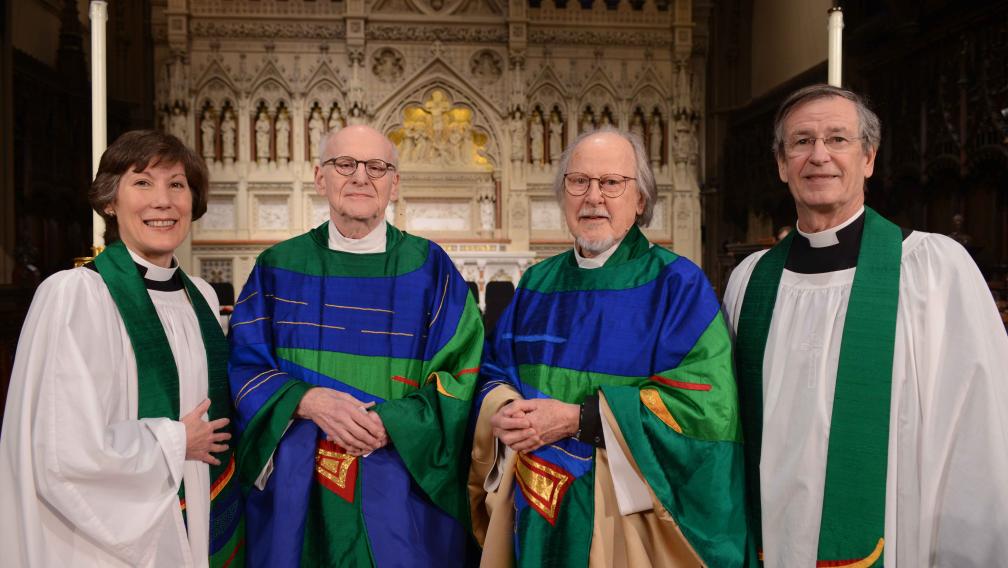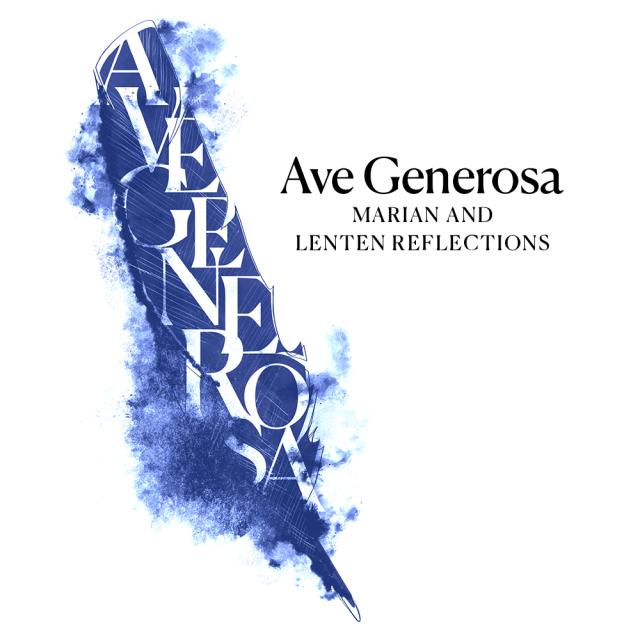Finding Sea Glass in the Rubble

The Rev. Dr. James Cooper, 17th Rector of Trinity Wall Street, reflects on his years at Trinity, including congregational vitality, real estate rezoning, grants, weathering a recession, and Haiti.
The job as Trinity’s rector is unique. How do you balance dealing with real estate and, for example, praying with people as you did in Haiti after the earthquake?
Well, it’s a combination of that whole package that we have. When we go into that setting, we pray, we read Scripture, we’re pastoring each other, but then there’s also the possibility for financial resources to assist. Trinity, wonderfully, can do both.
I have my most vivid memory of Haiti. We had seen the horror of the earthquake, and then we went out to their conference center, which is near the ocean, and there were two little boys walking on the beach, and I walked along with them. I wasn’t able to do the French and they weren’t much on the English, but as we walked I was finding sea glass amongst all the garbage and rubbish. They had never thought about a piece of sea glass and how it was sort of a precious stone, and beautiful, and then they ran up and down the beach to find pieces of sea glass.
That’s representative. Sometimes that little piece of sea glass puts in perspective the earthquake, the mess, the garbage. Still, there’s that little gem right there. No matter where you go, it’s always there.
How do you blend the two roles of pastor and CEO?
Well, I have many experiences of it in previous ministries in Albany, New York, and Florida. A wise person, I wish I could remember him, said, “Remember, in administration the center word is ministry.” There’s always the potential for ministry. So the rector in any church is both of those things.
Any favorite moments over the last 10 years?
There are things that represent all the wonderful moments with people and programs: the lighting of Jesus above [statue of] the crucifixion on the altar. When I came, only the crucifixion was lit, and now the risen Lord is lit, and to me that says it’s about life, and wonder, and joy. And I think my favorite service is Christmas Eve. It is just glorious. There’s nothing like Christmas in New York City and Christmas at Trinity Church. It pulls together all that we have into that one great celebration.
In 2007, 80 bishops gathered in El Escorial, Spain, to work on partnerships, with funding from Trinity. Half of the participants were U.S. bishops and half African. The style and format of that conference became the format for the 2008 Lambeth Conference. So those are high points that remind me of all the other high points along the way.
What are the things that have happened in your tenure that you feel most satisfied or fulfilled about?
I think helping the parish understand the breadth of the ministries of Trinity Church, to begin to know more about them from one ministry to another, one part of the congregation to another. It’s a very complex place, but [it’s important] to really look at what we do as a whole.
The other is the ability, with help from all over the map, to grow the resources for Trinity to fund those ministries near and far—our real estate portfolio and investment portfolio. I know that’s the business piece, but in our business relationships, when it’s with banks or realtors, we have a chance to be Gospel people.
What was the greatest honor or blessing of your 10 years?
It’s always the same: to stand in the center of the aisle in Trinity Church with the glorious choirs, and the ministries, and the activities, and to watch the diverse people come to communion.
What would you say, looking back, has been the toughest challenge?
Well, we celebrate diversity, of course, but there are other types of diversity besides that of humanity, and that’s opinions and direction. This is a very big place, and to try and hear all, and see a direction [where we] might go. That’s the most challenging and yet exciting piece: to interact with people and see where we can build a consensus, a vision, and a plan to implement ministry in New York and around the world.
Our congregation is very diverse. What are the blessings and the challenges of a diverse congregation?
Somebody asked me about that the other day, and I said, “You know, I no longer think of it as diverse. I just think of it as us.” On the other hand, we have to pay attention to keeping it diverse—how would that momentum be continued? It would be to [taking] those who are in the pew now and [reminding] them you’ve got to bring your friends from Brooklyn, or Battery Park, or one of the other boroughs, or New Jersey. The people that are here are diverse, and if they pray and work with their friends, and keep Trinity in the frontline of invitation and welcome, it will stay diverse.
Now that a year or two has passed, is there anything you’d like to say about the Occupy Wall Street experience?
Well, I think it was a missed opportunity on both sides. A portion of the Occupy movement got overly focused on Trinity Church, which hurt our ability to be part of the movement. While people were out in front of my home at three o’clock in the morning banging drums, we were also hosting the assemblies of Occupy at Trinity Church in our parish hall, and it just seems to me the dichotomy of that was just so strange. There was the portion of Occupy who raised the issue that we interacted with in a healthy and wholesome way, and then there was this other part that unfortunately distracted time and energy from that effort—couldn’t quite figure out how to navigate that divided process.
At one point several members of the vestry resigned. How do you look back on that experience?
Well, Jon Meacham, who was on the vestry, said, “It’s not unique. There’s conflict within the Church all the time.” Those who resigned were not asked to leave, but that was their decision, and we’ve moved on. I hope they’ve moved on as well. I don’t see all of them, but I see many of them.
What spiritual practices have you used to help your ministry when you’re under a lot of pressure?
My wife and I have a daily prayer life. I’m a member of the Associate Order of the Holy Cross, which has a particular discipline. So those are private, obviously. I try to attend the 8am [Eucharist] at St. Paul’s Chapel to hear the sermon. I don’t have time to stay for the whole service, but I’m just in the congregation, and just listening to that preacher on that particular morning, and that feeds me for the week.
You and Tay have been here for 10 years. You were in Florida for 32, and you were in Albany for a couple of years as well. Talk, if you would, about your partnership with Tay.
Well, I think they’re shared sacraments, marriage and ordination. Tay was not ordained, but she is confirmed, and so we both understand the Christian opportunities for leadership and participation. We’ve held that in common, even before I was ordained, of course.
Any favorite Scriptures that you go back to again and again?
“Behold the lilies of the field.” Our daughter teased me about that one. There was a song, “Don’t Worry, Be Happy,” and I said she was a little too humanistic. She said to me, “Dad, behold the lilies of the field.” It’s the same theme. Don’t worry, be happy, you know. Enjoy life. Yes, there are things to be done, and there are obstacles to be overcome. Her obstacle was hearing that she had a very severe cancer—turned out not be true, but she was able to behold the lilies of the field all the way through.
After the recession, Trinity’s grants increased, and its real estate now is doing extremely well. We were talking about your 10 years, and it sounds to me like stewardship of resources is a theme. Would you say that’s fair?
I would say stewardship when you include all of it—the people’s activities, and the funding that supports those initiatives. There is both, steward of the people, their faith and mine, and the financial resources we have to accomplish some things that need money from time to time.
You’ve talked in Africa about Trinity’s historical resources, and how it’s so important to use them in the context of stewardship. Do you want to say a little bit about that?
Well, the Church is the Church. You don’t need a dime to be the Church, but you do need to know you don’t have one, if that’s the case. So don’t spend beyond your means. If your means is zero, be the church without funds. That’s fine. If you have funds, don’t spend beyond your ability and then go off the deep end. So Africa is working on that. We at Trinity are working on that. Maybe the decimal points are in different places, but it’s still the same thing—be a steward of the resources you have and meet the needs of the day, but also prepare the church to have an extended life. It’s today, and the future, and the next generation.
I think that if the money is right you have a chance of doing the ministry right. It’s all by faith and finding our way. But if the money is all wrong, it’s hard to do ministry. But, again, you don’t need the money. You can do it with zero. But you need to have an operating plan that’s based upon zero.
Right now the priests at Trinity are relatively diverse in terms of race, gender, and sexual orientation. That’s obviously important to you.
We believe that baptism for all is the entry for all into ministry, and so why wouldn’t all people be able to act within all aspects of the ministry of the Church?
An important part of your time here has been the development of Trinity mission partners—in New Orleans, in Queens, in Panama, in Africa, and also in Haiti. Why has it been important to you for Trinity to have those kinds of partners?
Well, I think it’s been important to all of my predecessors as well, but [we also] have more members of the congregation involved in the ministries in those distant places, along with New York. When a group goes to New Orleans, and it is made up of staff members who are taking vacation time, paying their own way, and congregational members who are taking vacation time from their jobs, and paying their own way, it’s pretty loud and clear that this is a group committed to the work that they’re doing, personally committed.
How do you look back on the Sandy experience?
Because we were in Manhattan, and our home is in the midst of the real estate portfolio, I walked the properties. Our staff was not here, other than our security and maintenance staff. For just those two days [I would walk] around and hear their stories—some of them could not get in touch with their families, and here they were taking care of our buildings. They couldn’t communicate with their families, and there they were. So you really create a bond in that kind of time.
Following that, as we began to work particularly in Staten Island, where you’re with people trying to recover, it’s about the tragedy and the mess, but also about the personal relationship you develop; somewhere along the line is that little piece of sea glass [that] enlivens people, and they begin to rebuild, not as quickly as hoped, but begin to rebuild.
You emphasized the fact that the buildings in Trinity’s real estate portfolio are not just buildings: they’re the livelihood of people.
There are 13,000 people that work in our buildings for these companies that employ them and give them their livelihoods, so they can have housing and send their kids to college. We’re a piece of it and try to be a healthy and safe environment for those who come to work each day.
Are there any characteristics that especially define Trinity Wall Street?
It’s on Broadway, but it’s also on Wall Street, and strangely enough, when you look up Wall Street you don’t see the Stock Exchange, you see Trinity Church. I think it speaks loudly about the city of New York, that it’s a gathering place, it’s an international city, it’s a platform for moving a social agenda and the Gospel.
It’s like meeting a person. After you meet a person, you know a piece of [him or her], but the more time you spend, the more broadly you will understand the person, and Trinity is very profound, very complex. So if you only know one thing about Trinity, you probably don’t know the whole story.
Hudson Square has to be one of the areas that you look back on with a certain amount of fulfillment. Tell us why that was important.
Well, because I’m a history major, I tracked the changes in that part of New York City for 300 years, from residential, to farms, to light industry, to housing, now to a mixed neighborhood. To see it actually move from all commercial office space to residential and more dynamic retail, it’s community building.
Do you feel that you placed more emphasis on Trinity as part of the neighborhood?
It wasn’t as out of balance as some may have thought. We were getting lots of attention and celebration of the enormous work in Africa, particularly highlighted by Trinity’s participation in the anti-apartheid movement. I think what was being asked, as I came, was to see that we can celebrate the wonderful activities in New York City with the same joy and vigor. It just needed a little higher visibility. Now it’s through music and the arts, education, focusing on street ministry, and housing, that those are more understandably a vital part of our life.
So what happens next after February?
After February we’ll return to Florida. We [will] just take a breather and look at some opportunities in civic work and where we could help the Church somewhere, either Florida or perhaps through other international connections that we’ve developed over our entire ministry. The part that hasn’t really sunk in is missing New York and Trinity.
Click here to read the entire issue of Trinity News.






